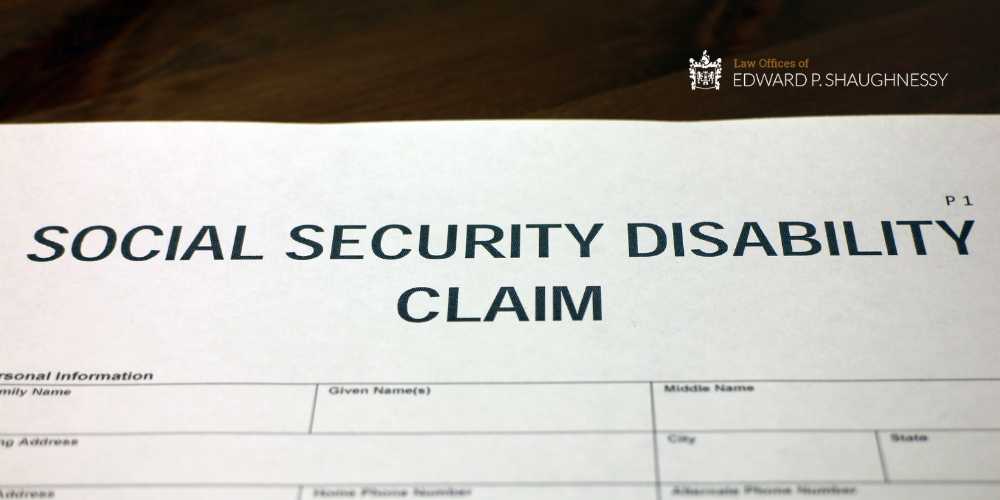When navigating the disability application process, recognizing the signs that you will be approved for disability benefits or SSI benefits can provide hope and clarity. The best signs include having a disabling condition that significantly impairs or prohibits substantial gainful activity, such as being unable to work due to a serious medical condition. If you are receiving regular treatment and have documented evidence of your disability claim and work history, it strengthens your disability application. The Social Security Administration will review these factors to determine eligibility for Social Security Disability Insurance (SSDI) and approved disability benefits. For those seeking benefits for disabled adults living with parents, consulting with an Easton Social Security disability attorney can be beneficial.
Our Social Security disability attorney team offers a free consultation to help you understand the process for being approved for disability benefits and can help you with the appeals process if your initial application was denied.
Signs Your Disability Claim Will Be Approved
Applying for Social Security disability benefits can be a challenging process, but certain signs may indicate a higher likelihood of being approved for disability.
The Social Security Administration (SSA) looks for medical conditions that are severe and expected to last at least one year or result in death. If your medical condition meets these criteria, this is a good sign that your disability claim will be approved. Examples of medical conditions qualifying in disability claims include advanced-stage cancers, severe neurological disorders, and chronic heart conditions.
To qualify for disability benefits, medical conditions must prevent claimants from performing any substantial gainful activity (SGA). The SSA considers whether the medical condition hinders past work employment due to complex work duties, but also considers unskilled work opportunities, as well.
A well-prepared application that accurately details your medical conditions, work history, and limitations can make a difference in disability claims.
Having an experienced Social Security disability attorney who understands the disability application process can greatly improve your chances of being approved for disability. They can help gather necessary documentation, prepare your case, and represent you during the appeals process if necessary.
Enough Work Credits to Qualify for Social Security Disability Benefits
Work credits are a measure used by the Social Security Administration (SSA) to determine eligibility for disability benefits. Social Security disability benefits are only available to applicants who have enough work credits. These work credits are earned by paying Social Security taxes and are influenced by age.
To have enough past work credits, you must have been employed for 5 out of the last 10 years. The number of work credits you need for Social Security disability benefits depends on your age and the onset date of your disability.
Work Credit Requirements by Age:
- Age 24 and younger: You need six work credits earned in the three years before your disability began.
- Ages 24 to 31: You need credits for half the time between age 21 and when your disability began. For example, if your disability began at age 30, you need four years of work history and 16 work credits.
- Age 31 to 42: You generally need 20 work credits earned in the last ten years before your disability, but the total number of credits needed increases with age.
- Ages 42+: Here, the the number of work credits needed is based on a sliding scale that adds two work credits every two years to the 20 work credit requirement.
For additional information, contact an Easton Social Security disability attorney at the Law Offices of Edward P. Shaughnessy for a free consultation.
A Medical Condition That Prevents You From Working For Over One Year
To qualify for Social Security Disability Insurance (SSDI) or SSI benefits, you must have a medical condition that prevents you from working for at least one year (not a few months) or is expected to result in death. The condition must be severe enough to limit your ability to perform basic work activities.
If you are receiving regular treatment and can provide comprehensive medical records to support this, that is a good sign you’ll be approved for disability.
If you have a condition that will likely not improve, such as Multiple Sclerosis, amyotrophic lateral sclerosis (ALS) that may progress in a few months, or severe heart disease, you’ll have a better chance for approval for SSDI and SSI benefits.
Substantial Medical Evidence Proving Your Medical Condition
To be approved for Social Security Disability Insurance (SSDI) or SSI benefits, you must provide substantial medical evidence proving your disabling condition. The Social Security Administration will use detailed records from healthcare providers documenting the severity and impact of your condition to determine your eligibility.
Examples of strong medical documentation include doctor’s notes, imaging results like MRIs, CT scans, or X-rays, lab reports, and detailed treatment histories. These documents should clearly outline how the condition affects your ability to work.
The Social Security Administration will deny a disability claim because of a lack of substantial evidence that falls within the confines of their “blue book” definitions.
If a medical condition does not meet the blue book’s listing rules, you can still qualify for SSDI benefits by proving that your residual functional capacity (RFC) prevents you from being employed.

Substantial Medical Evidence Proving You Cannot Perform Your Previous Job Duties or Sedentary Work
To qualify for SSDI benefits, you must provide substantial evidence proving you cannot perform your previous job duties or any sedentary work. This includes comprehensive medical records, such as doctor’s notes, lab results, and imaging reports, that clearly show how your condition limits your abilities.
Conditions like severe arthritis might prevent someone from doing an office job that requires typing, or back injuries could hinder lifting tasks in a past job. The Social Security Administration (SSA) also evaluates your ability to perform other types of work based on five categories: sedentary, light, medium, heavy, and very heavy.
- Sedentary work involves sitting most of the time and lifting no more than 10 pounds.
- Light work requires lifting up to 20 pounds and involves a good deal of walking or standing.
- Medium work entails lifting up to 50 pounds and frequent lifting or carrying of objects weighing up to 25 pounds.
- Heavy work involves lifting up to 100 pounds and frequent lifting or carrying of objects weighing 50 pounds or more.
- Very heavy work is a physically demanding job that requires lifting objects weighing more than 100 pounds.
If evidence, such as MRI results or detailed physician statements, shows you cannot perform tasks even with normal breaks, this strengthens your disability claim.
When the SSA considers your disability benefits application, they look at your physical residual functional capacity. Here, the Social Security Administration uses your medical evidence to determine the potential of employment for any physically demanding job. If your physical limitations render you unable to perform your previous employment duties or any other physically demanding job (and your education or age prevents you from being employed elsewhere), then this is one of the best signs you will receive benefits.
You Are Unable to Perform Unskilled Work
Those with medical conditions who don’t have an advanced degree or certificate are in better positions to receive SSDI and SSI benefits. A lack of higher-level education means applicants may not have the capacity to perform skilled work.
Skilled work is any job that requires new skills or education that cannot be learned in any other profession. This can apply to teachers or plumbers.
Unskilled work is an employment opportunity that can be learned in a short period. Examples include janitorial positions, lawn care and basic clerical tasks done in an office job. These jobs do not require an advanced degree or specialized training.
Those with a mental impairment could potentially succeed in a physically demanding job, while those with a physical impairment could potentially succeed in sedentary work that doesn’t require extensive education.
The Social Security Administration (SSA) determines your ability to perform unskilled work by reviewing medical records, treatment histories, and physician statements. They assess whether your condition limits your capacity to perform tasks consistently and reliably.
If your case goes to a hearing with a Social Security Administration judge, your skills and education will be critical in assessing whether or not you can perform alternative work. Skills may transfer from one job to another.
Hire a Social Security Lawyer
Hiring a Social Security lawyer can significantly improve your chances of being approved for disability benefits. A Social Security disability attorney can gather your medical records, work history, and other vital documents needed for your disability claim. They know precisely what the Social Security Administration looks for, ensuring your application is thorough and accurate.
Lawyers can also represent you on your hearing date, using their skills and education to persuasively argue your disability claim. They handle the paperwork, deadlines, and communication with the Social Security Administration, making the application or appeals process smoother and less stressful.
For personalized assistance, contact an Easton SSI benefits lawyer by calling 610-258-9955.

Signs You Won Your Supplemental Security Income (SSI) or Social Security Disability Insurance (SSDI) Hearing
Receiving a decision in a short period after your hearing can be a good sign that you will be approved for disability benefits. If the judge issues a favorable decision quickly, it often indicates that the evidence presented was compelling and clear. This may include thorough medical documentation from the Blue Book, consistent work history records, and strong testimony.
Another top sign is when the judge references your residual functional capacity (RFC) and determines that your condition meets the medical-vocational guidelines. This means they believe your medical condition limits your ability to perform any substantial work and aligns with the SSA’s criteria for disability. Receiving regular treatment and having consistent medical records also support your case significantly.
Additionally, being awarded past-due benefits is a positive indicator that you won your case. This means the SSA acknowledges that you were eligible for SSI benefits or SSDI benefits from the date you initially applied or from the onset of your disability. If you meet the retirement age requirements and have substantial evidence, it further strengthens your case. For individualized assistance on top signs that you will be approved for disability, contact an experienced Social Security disability lawyer.
Signs That You Lost Your Disability Hearing
Certain signs may indicate an unfavorable outcome in your disability hearing. If the judge did not make a bench decision, it might suggest doubts about your eligibility for disability benefits. A focus on your past work, complex work duties, and the ability to transfer skills to other jobs can indicate they believe you can still perform substantial gainful activity. Insufficient medical evidence aligning with the Blue Book criteria, residual functional capacity, and medical-vocational guidelines also suggests a likely denial.
If the judge emphasizes your ability to learn new skills or perform other jobs, it is a strong indicator that your disability claims might be denied. Additionally, if there are issues with your contributions, such as not having enough work credits, this can be a reason for denying the claim, as it reflects on your eligibility based on your work history.
How Long Does the Social Security Administration Take to Approve SSDI Claims
The time it takes for the Social Security Administration (SSA) to approve an SSDI claim can vary. For the initial application, it typically takes about three to six months to receive a decision.
If your initial application is denied, you can request a hearing, significantly extending the process. The waiting time for a hearing date can be several months to over a year, depending on your region. After the hearing, it may take additional months to receive the initial decision from the administrative law judge.
Staying proactive by following up and providing requested information promptly can help keep your case moving forward and manage expectations regarding your social security benefits.

How an Easton Social Security Disability Lawyer Can Help
An Easton Social Security disability attorney can streamline the often time-consuming appeals process for your SSDI claim. They can gather compelling medical evidence, address how your age and physical limitations prevent you from skilled work, and ensure your application meets SSA standards. Their understanding of the appeals process can significantly enhance your chances of being approved for disability benefits.
By emphasizing signs that you will be approved for disability, such as strong medical documentation and the inability to perform past or new work, a lawyer can strengthen your case. For dedicated assistance, contact an Easton civil litigation attorney today at the Law Offices of Edward P. Shaughnessy and improve your chances of securing the benefits you deserve. Call (610) 258-9955 to schedule your free consultation.




